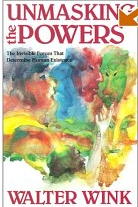Have you ever read a book that blew your mind?
“The Powers” Trilogy by Walter Wink are three of the most challenging books I’ve read in a while. I’m not saying I agree with everything in them, but the concepts in these books are so “otherworldly” that it will take me some time to grasp and process what he says. For these reasons, all three books have a place on my “Burning Books” list.
I have previously reviewed Naming the Powers in which Wink provides most of the exegetical and Scriptural data for his study.
 In the second volume, Unmasking the Powers, he delves deep into explaining several of the key forces behind human existence, and how they govern our lives. The topics Wink discusses are not often taught about in churches or seminaries, and if a pastor were to teach some of what Wink believes, it is likely that he or she would get fired.
In the second volume, Unmasking the Powers, he delves deep into explaining several of the key forces behind human existence, and how they govern our lives. The topics Wink discusses are not often taught about in churches or seminaries, and if a pastor were to teach some of what Wink believes, it is likely that he or she would get fired.
Like what?
Well, let me give you some examples. In his chapter on “Satan” he writes this:
We have so moralized [Satan] that we fail to see that the most satanic temptation of all is the temptation to become other than ourselves. When people try to be “good Christians”—what is that but Satan’s crowning victory? For “being a good Christian” is always collectively defined by some denomination or strong religious personality or creed. One does not need to “live by every word that proceeds from the mouth of God” in order to be a “good Christian”; one need only be pliant, docile, and obedient (p. 19).
Or this:
[William Blake writes that] Every religion which preaches vengeance for sin is the religion of the Enemy and Avenger, and not the Forgiver of Sin, and their God is Satan, Named by the Divine Name. Blake is not talking about Satanism, but about Christian churches that behave satanically under the banner of Christ. To his criterion for discerning satanic “Christianity” we might add these: hostility toward those who are different; projecting evil on other who are then demonized; claiming doctrinal certitude; breeding psychic dependency, unconsciousness, stagnation, fear, guilt, or hatred; depicting God as a monster (as in ascribing the death of loved ones to God). Satanic Christianity can be rigidly legalistic or morally slack…but these are characteristics of much of what passes as Christianity (p. 36).
Try preaching that in your church and see how long you last.
Quotes like this are found on nearly every page, and what Wink says will challenge everything you believe about the spiritual realm, not only about Satan, angels, and demons, but also about politics, government, science, and nature.

The last half of the book was incredibly uncomfortable reading for me, as much of what Wink wrote seemed to border on spiritism, animism, polytheism, mysticism, and maybe even some Gnosticism. But I think that in the end, he was able to demonstrate that when Christianity moved away from such errors, we let the pendulum swing too far.
The call of Walter Wink is for followers of Jesus to return to a proper and biblical understanding of the powers that are around us, in us, and through us, and which share creation with us. Only in this way can we truly worship God with all of creation.




I love where he says “To his criterion for discerning satanic “Christianity” we might add these: hostility toward those who are different; projecting evil on other who are then demonized; claiming doctrinal certitude;…depicting God as a monster (as in ascribing the death of loved ones to God).” I completely agree! A book could be written on each item on the list.
I would suggest his piece “Homosexuality and the Bible” (written in the mid 90’s, if I remember correctly). That one would also get you fired for preaching it. The piece discusses more than homosexuality, including “Hebrew Sexual Mores”, “The Problem of Authority” and “Judge for Yourselves”. I especially find interesting his statement “In short, of the sexual mores mentioned here, we only agree with the Bible on four of them, and disagree with it on sixteen!”
Sam,
I have been so enthralled by Walter Wink, I think I am going to get and read everything he has written, including that book on homosexuality and the Bible. He also has written a book on a Socratic Bible study method, which sounds interesting.
It’s more of an ,rather than a book. You can find it here: http://www.godweb.org/wink.htm
After you have read it, read a rebuttal. One is found at:
http://www.nathancolquhoun.com/2009/07/12/homosexuality-and-the-bible-by-walter-wi Read the comment by Andrew.
That rebuttal will give you some of the basic arguments used by some conservatives in their rebuttals of much of Wink’s writing.
Wink’s basic point in the is that Christians pick and chose what they wish to follow, change or ignore from the Bible on sexual issues. He and I would agree that passages that appear to condemn homosexuality are interpreted very conservatively, while other passages that speak to sexual behaviors that many “straight” Christians practice are largely ignored or reinterpreted.
After reading the and the rebuttal, I see a lot of prooftexting. The reason Jesus didn’t mention homosexuality is that no Jew would ever do that, but jews were divorcing like wild fire.
But all in all, we all know that homosexuals have many partners, and there is much promiscuity. Jesus said no adultery! The homosexuals are trying to change US laws to legitamize gay marriage. But even if it IS legitimized, the avg gay marriage lasts 6 months to a year, which much cheating going on anyway.Read the Talmud. Sodom was destroyed for homosexuality, not for lack of hospitality. Maybe Charles Henderson has a gay son. Or maybe he’s gay himself, but the was dripping with a liberal viewpoint through out. While he made valid points, he also obfuscated a lot of the plain message of the Bible.
If there’s info. online about Henderson being gay or having gay family members, I didn’t find it. A liberal viewpoint on the issue does not mean that the person holding the viewpoint is gay or has gay family members.
I have hundreds of gay friends and only a handful could be described by your characterization.
I wasn’t implying that being a liberal Christian meant homosexual, but he seemed to try ‘really’ hard to make the bible fit his viewpoint. It’s almost like he had an agenda.
I am heading over to read the articles now!
Thanks for the two links. I will have to check them both out.
We Christians do love to pick and choose, don’t we?
Maybe I’m confused, but the article in question is by Walter Wink, not Charles Henderson, right? Charles is the site owner and host, not the author of that article.
The first link goes to one of many sites that give the text of the article. The Godweb site displays the article is in an easy-to-read format. The site also presents an article on the same topic by Ulrich Mauser, which presents an opposing perspective. I didn’t notice anything that indicates if Henderson personally agrees with either perspective.
The second link, in the rebuttal of Wink’s article (in the comment by Andrew), uses arguments similar to those that are used elsewhere to rebut much of Wink’s other writing (“mis-reading” & “poor reading” of the Scripture, “assuming”, not asking what Jesus thought, etc.)
I mentioned this article by Wink in the first place because it was so controversial, and revealed a great deal about his opponents in their rebuttals, especially their overall opinions of Wink.
Wink has an interesting perspective on many issues. Churchmen tend to take issue with much of what he writes, in my opinion because they do not like him. He is less than flattering in what he says about them and their churches. Personally, I find his writing and perspectives very interesting.
Sam,
Have you read much of Wink? I am finding his Powers Trilogy to be incredibly challenging. If he is right, my entire world view will turn upside down.
No, I have not read those books, but would love to. Getting to know our neighbors, especially since we’ve handed out the flyers for the 4th of July party is taking lots of time. Two days ago I spent over three hours mostly listening to one person tell me about family problems. Yesterday I was cooking a giant batch of soup and people kept coming over to talk. Today I ran into a neighbor at Home Depot and we talked for an hour and one half.
I love it! I love these people and love talking to them. Some of them tell me what they don’t tell their pastors, if they have one. For some of them I am their pastor. For me, this is where theology meets the people. It’s where Jesus intersects with everyday living.
I just thought that with the way you spoke about Wink, you had read him. So you were just talking about his online articles.
I have never considered myself a pacifist, but I found this article of his the other day, and will give it a read:
Beyond Just War and Pacifism: Jesus’ Nonviolent Way
I read the article on “Jesus’ NonViolent Way”. I especially identify with the third way. I have not read any of Wink’s books that I remember, but have read reviews, whose writers tend to love his views or hate them. Noting who hates his writing, I’m sure he is someone I would like to read more.
I read the article today too. I love his insights on Matt 5! I want to read more of him too.
—-“I love it! I love these people and love talking to them. Some of them tell me what they don’t tell their pastors, if they have one. For some of them I am their pastor. For me, this is where theology meets the people. It’s where Jesus intersects with everyday living.”
Sam,
you might have the gift of pastor. The true gift. You might have a pastor’s heart, which is a great gift to have. Are you in an organic fellowship? Where do u live?
San Diego. We are part of a group which is not quite what Frank Viola would call organic. In a day or two I will start a short series on Graceground on planning group events, then I will do a few posts on being the church in the community. In one or two of those posts I will give more info. about our group.
“Pagan Christianity” blew my mind. I was ANGRY after I read the book. I was taking seminary classes online,and JUST bought books and paid for my last semester, when I read the “Pagan”. Consequently, I dropped out. My wife was thrilled I was leaving the church system. She thought it was phony anyway.I have yet to read a book that has impacted my life as much as that one did.
The next book that blew my mind was “The Early Christians
In Their Own Words” http://www.plough.com/ebooks/earlychristians.html
Eberhard Arnold painstakingly compiled every early Christian author before 200 AD and wrote what they believed and how they lived their life. From that book, I was introduced to the “Epistle of Diognetus”, which was an atheist writing to another atheist describing a Christian: “For the Christians are distinguished from other men neither by country, nor language, nor the customs which they observe. For they neither inhabit cities of their own, nor employ a peculiar form of speech, nor lead a life which is marked out by any singularity. The course of conduct which they follow has not been devised by any speculation or deliberation of inquisitive men; nor do they, like some, proclaim themselves the advocates of any merely human doctrines. But, inhabiting Greek as well as barbarian cities, according as the lot of each of them has determined, and following the customs of the natives in respect to clothing, food, and the rest of their ordinary conduct, they display to us their wonderful and confessedly striking method of life. They dwell in their own countries, but simply as sojourners. As citizens, they share in all things with others, and yet endure all things as if foreigners. Every foreign land is to them as their native country, and every land of their birth as a land of strangers. They marry, as do all [others]; they beget children; but they do not destroy their offspring. They have a common table, but not a common bed. They are in the flesh, but they do not live after the flesh. They pass their days on earth, but they are citizens of heaven. They obey the prescribed laws, and at the same time surpass the laws by their lives. They love all men, and are persecuted by all. They are unknown and condemned; they are put to death, and restored to life. They are poor, yet make many rich; they are in lack of all things, and yet abound in all; they are dishonoured, and yet in their very dishonour are glorified. They are evil spoken of, and yet are justified; they are reviled, and bless; they are insulted, and repay the insult with honour; they do good, yet are punished as evil-doers. When punished, they rejoice as if quickened into life; they are assailed by the Jews as foreigners, and are persecuted by the Greeks; yet those who hate them are unable to assign any reason for their hatred.”
That is an amazing quote by Diognetus. It shows that all the ways many Christians separate themselves from the world today are not the ways the early Christians separated themselves, and the ways that that we participate in the world today are the ways that the early Christians separated. We have it all backwards, don’t we?
I have downloaded that book, and will read it soon. Thanks for the link!
Why would your world turn upside down after reading Wink? I’ve never heard of him until now.
I ran across several quotes from him in the books by NT Wright and in The Irresistible Revolution . I think that is where I heard of him, anyway.
. I think that is where I heard of him, anyway.
He has a take on angels, Satan, and demons which I have never heard before, and which seems to fit the biblical text in a way that, if true, would cause me to read much of Scripture in a whole different way, and which would cause me to view life, and governments, and cities, and politics, and animals, and plants and pretty much everything in a whole new way also.
I’ve written a few reviews on two of his books so far:
Naming the Powers
Unmasking the Powers
Jeremy
I am thrilled to remember Wink again, I was influenced by him some in the 80’s, but went on to other adventures.
I lapped-up your 3 powers reviews,and look forward to reading Wink directly on this subject, and others. Sounds like I have a lot of alignment with his views.
I enjoyed your POV and that of your other posters, and look forward to reading more of your work.
Best, wendy
Wendy,
There is so much in Wink’s books, I find myself returning to them time and time again. I often find myself reading some book by some other author, and they reference Wink’s trilogy, and I think, “I didn’t know he wrote about that!” and I go look, and sure enough, there it is.